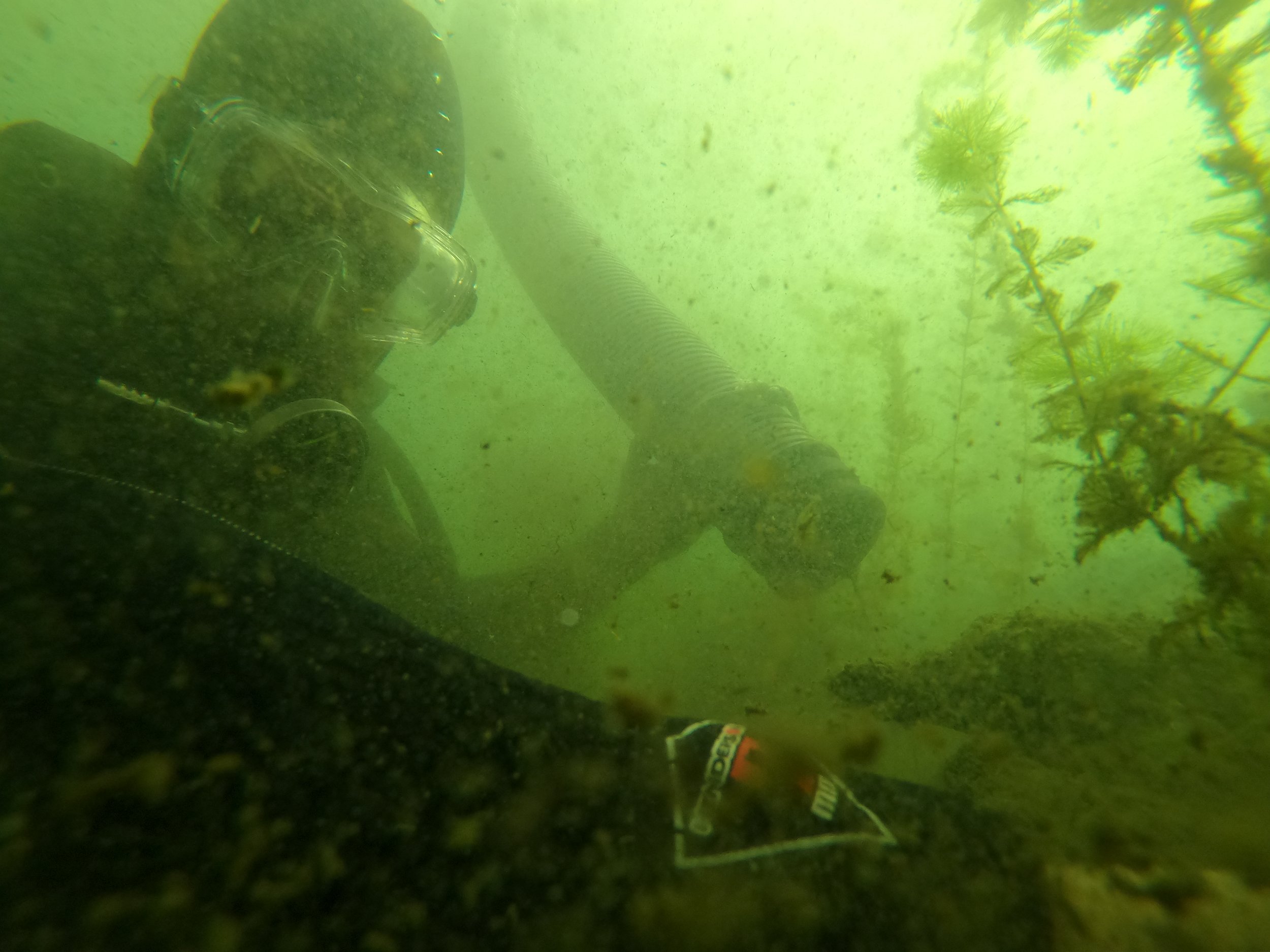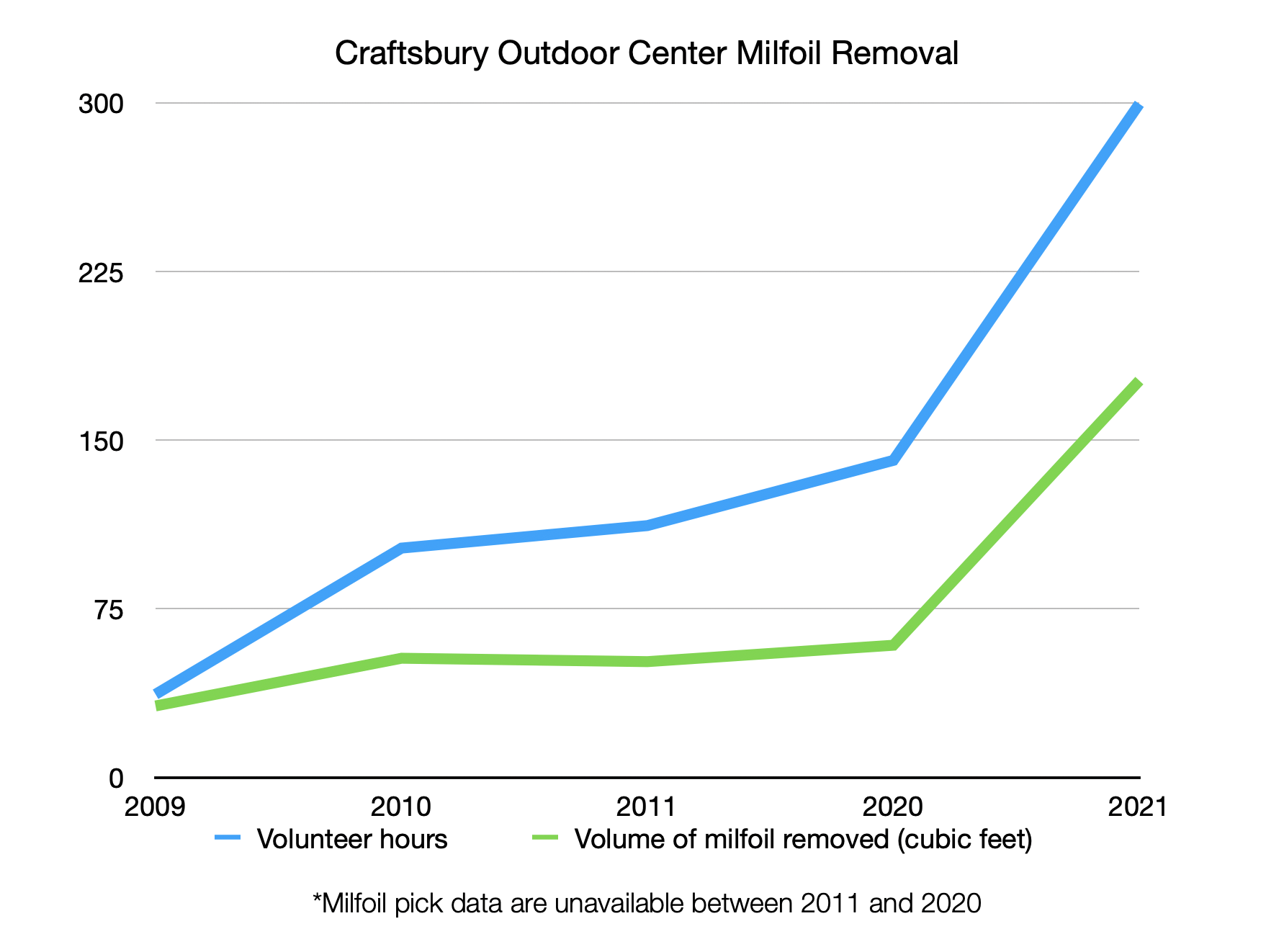Craftsbury's milfoil mitigation
One of the intrepid divers vacuuming up milfoil in Big Hosmer Pond
Each summer for the past 25 plus years, combinations of staff from the Craftsbury Outdoor Center, volunteers from the Green Racing Project and the Craftsbury community have collaborated to remove thousand of pounds of invasive Eurasian milfoil, M spicatum, from Great Hosmer Pond. Mitigation efforts such as hand picking, hybrid picking, and diver assisted suction harvesting (DASH) can significantly reduce the plant’s visibility in the lake and its effect on lake users, human and wildlife.
Although milfoil was deemed fully established in Great Hosmer pond in 2020, by focusing volunteer efforts on mitigating the worst of the outbreaks in the lake the Craftsbury Outdoor Center aims to maintain Hosmer as a cherished treasure for locals as well as a destination for guests.
First identified in Great Hosmer in the late 1990s, milfoil is most often introduced to lakes as small fragments transported by unwary humans on powerboats and trailers. Thanks to its frankly impressive ability to establish roots in almost any substrate, even a few fragments can beget a permanent population in a body of water. Once a fragment has settled and developed roots, the plant grows quickly, forming floating mats of vegetation, and is easily fragmented by passing boat traffic, leading to further spreading throughout the lake.
Once established, milfoil proliferates so quickly that its ecological impacts become severe in the space of just a few seasons. The dense growth reduces the species richness of the lake by outcompeting native plants, in turn creating a less favorable habitat for invertebrates, forage fishes, and the gamefishes that feed on them. Milfoil also creates challenges for human lake users, occupying swimming areas and troubling boat traffic in the lake.
The first milfoil removal efforts in Great Hosmer were spearheaded by John Brodhead. In the early days, small teams of snorkelers would remove plants from the lake by hand, picking individual stalks one at a time. Beginning in 2009, Craftsbury Outdoor Center began utilizing SCUBA gear to remove greater volumes of milfoil from the lake. Increased dive times afforded by SCUBA allow divers to pick and bag milfoil underwater, but the process is still fully dependent on volunteers from GRP and the Craftsbury community and limited by the availability of skilled divers’ volunteer schedules.
To help improve divers’ efficiency in removing plants, Green Racing Project volunteers developed a novel picking method that streamlines the milfoil handpicking process by separating the picking and bagging aspects of harvesting. In this hybrid method, SCUBA divers are responsible for picking milfoil stalks, which then float to the surface. A large net is put in place, encircling the picking location and allowing volunteers on the surface to corral and remove the milfoil from the lake. This allows faster picking, especially in areas of dense growth, while minimizing the risk of lost plants re-rooting elsewhere in the lake. In addition to greater picking volumes, a major benefit of this picking strategy is that it remains entirely human powered, allowing it to be deployed outside the mechanized suction harvesting window.
Suction harvesting, often referred to as DASH, currently offers the greatest milfoil removal ability. Originally a service provided by contractors for short periods, the Outdoor Center’s 2021 purchase of a full complement of suction harvesting equipment allows volunteers on the lake to mechanically remove milfoil from the lake throughout the summer at a rate almost twice as fast as earlier operations.
While drawbacks to DASH include a limited operating season, significant investment, and the added noise of a suction pump, suction harvesting allows a team of three volunteers to remove up to 120 gallons of milfoil from Great Hosmer Pond in just a three hour span with a minimum of lost fragments. Additionally, milfoil picked with DASH methods is compacted by the force of the pumps, so a 20 gallon bucket of milfoil contains significantly more biomass than the same bucket does when filled by hand. This picking speed allowed volunteers to remove record levels of milfoil from the lake in 2021, although the team’s hard work has been matched by exceptional milfoil growth in 2022.
The milfoil team is currently led by Davis Sutherland, with support from Luke Rein and numerous Green Racing Project athletes and Craftsbury community members. Davis can be contacted via e-mail here.




